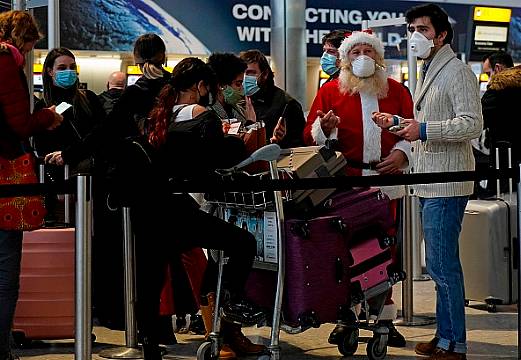Recent days have seen increased debate surround the restrictions in place on arrivals into the Republic amid the Covid-19 pandemic — including the lack of enforcement of quarantine requirements.
Here is everything we know about travel during the pandemic — from what's on the table in terms of new restrictions, to how the Government intends to manage the Border between the Republic and Northern Ireland.
Why is there a new focus on Covid-19 travel restrictions?
The focus comes amid concern over the spread of new and more transmissible variants of the virus taking hold in the community in Ireland.
Some 33,000 people are currently entering the country each week — the vast majority for “essential reasons” according to the Tánaiste.
However, public health experts such as Professor Gabriel Scally have warned the circulation of new variants will inevitably impact both mortality and vaccine efficacy in Ireland.
But doesn’t travel account for just a small number of cases?
Data from the Health Protection and Surveillance Centre (HPSC) found that just 0.38 per cent or 175 cases detected in the Republic were related to travel in the two-week period from January 9th to 22nd.
However, officials from the National Public Health Emergency Team (Nphet) have previously said the Republic’s contact tracers do not have the resources to track cases of the virus back to their original source of infection.
The World Health Organisation (WHO) has said that new and more transmissible variants of the virus contributed to the recent surge of cases seen on the island.
In another indicator of spread linked to travel, one variant — first identified in the UK before Christmas and potentially linked to higher mortality — is now believed to account for some 60 per cent of Irish cases.
Wait — doesn’t Ireland already have restrictions in place on international travellers?
Ireland has asked those arriving into the Republic to fill out a passenger locator form and restrict their movements for 14 days since the early months of the pandemic — aside from some exemptions on a 'green list' during the summer.
However, there has been limited enforcement of this quarantine period, with compliance largely hinging on an honour-based system.
Since November, the country has operated within an EU-wide traffic light system for travel, which has allowed for those arriving from 'green' or 'orange' regions with low rates of the virus to forgo a quarantine with proof of a negative test.
Those arriving from 'red' regions in Europe with a high rate of Covid-19, or from anywhere else outside the EU, are asked to restrict their movements for 14 days — although this can be exited early with a negative test for the disease on day five.
Arrivals from Britain, South Africa and South America must quarantine for 14 days regardless of any negative test, amid the spread of more contagious variants from these regions.
Since January 16th, the State has also required all arrivals into Ireland to provide proof of a negative PCR test for the virus, carried out within 72 hours prior to arrival.
Seems like a lot of restrictions — what’s the problem?
The country’s chief medical officer, Dr Tony Holohan, has warned that this testing regime will still allow some 40 per cent of cases to enter the country undetected.
Furthermore, authorities do not have the legal right to stop a person without proof of a negative test for Covid-19 from continuing on their journey into the country.
The country’s deputy chief medical officer has voiced his support for stricter measures, saying mandatory quarantine should be introduced for people coming into Ireland.
Dr Ronan Glynn told the Oireachtas Health Committee that Ireland's current regime on international travel makes it more difficult to maintain suppression of Covid-19, particularly in light of new strains of the virus.
Alright — so what’s on the table in terms of new travel restrictions?
According to the Minister for Transport Eamon Ryan, the Government is set to introduce a raft of tighter measures around travel.
The Government’s sub-committee on Covid-19 will meet this evening to consider further proposals, which will then need to be approved by the Cabinet on Tuesday.
The measures include:
- Garda checkpoints at roads surrounding airports to establish if a journey is essential — which have already begun to take place.
- Giving gardaí powers to prevent air and ferry passengers who do not have a negative PCR test from travelling on into the country.
- No longer allowing people arriving from certain countries, including South American countries and South Africa, to travel to Ireland on a short-term holiday visa, in a move to limit travel from variant hotspots.
- Intensifying checks on people quarantining at home after travel, including follow-up visits and fines for those found not to be complying.
Are mandatory hotel quarantines under consideration?
The new measures under consideration include those who arrive in the State without proof of a negative PCR test for Covid-19 being automatically placed in mandatory quarantine.
There has been some indication that this quarantine may last for just five days rather than 14.
Hotels such as City West in Dublin have been earmarked as potential quarantine hotels, a measure that has been utilised in Australia since the onset of the pandemic last year.
The Tánaiste, Leo Varadkar, has said a limited mandatory hotel quarantine for those arriving without a negative test result or from variant hot spots may in time be extended.
He said this would be “challenging and could take a few weeks to operationalise but would give us the advantage of learning how to do it successfully should the policy be widened to more incoming travellers at a later point”.
What about Northern Ireland and the Border?
The Minister for Transport has confirmed the Government is seeking an all-island approach to travel arrangements in both jurisdictions.
He said it hoped to “close the door” based on an agreement with the five parties of the Northern Ireland Executive.
The Government has maintained that “sealing the Border” is an approach that will not be taken. However, it intends to introduce tighter measures around cross-border travel, including Garda check points five kilometres from the Border, Mr Ryan said.
Anyone found travelling without a valid explanation will be subject to prosecution and fine.
Separately, a group of scientists and academics advocating for a strategy of Covid-19 elimination has written to the Government with a number of solutions, including a buffer zone along the Border to stop the spread of the virus.
What about talks over a ‘two-island’ approach with the UK?
There has been some indication that a “two-island” approach to travel may be taken in partnership with the UK.
Mr Ryan said if an all-island approach cannot be reached with Northern Ireland, the Government intends to “work very closely with the UK government” to ensure there is not a “backdoor” into the country.
The Taoiseach Micheál Martin has confirmed that talks are ongoing between Ireland and the UK regarding a joint solution to mandatory quarantining.
What has been the reaction to the new Government proposals?
The leader of the Opposition has described proposals to quarantine only those who arrive without a negative Covid-19 test as “absolutely insufficient”.
Sinn Féin's Mary Lou McDonald said the Government needs to introduce a mandatory form of quarantine for 14 days for all arrivals into Ireland, and that current proposals do not go far enough.
Separately, public health expert Professor Anthony Staines has said a five rather than 14-day quarantine requirement for passengers arriving into Ireland will allow too many cases to spread into the community and will be a “waste of time”.







